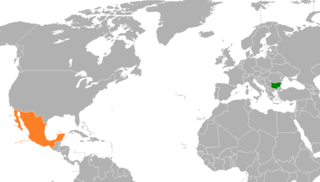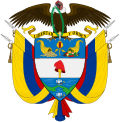Colombia seeks diplomatic and commercial relations with all countries, regardless of their ideologies or political or economic systems. For this reason, the Colombian economy is quite open, relying on international trade and following guidelines given by international law.

Foreign relations of Latvia are the primary responsibility of the Ministry of Foreign Affairs. Today's Republic of Latvia regards itself as a continuation of the 1918–1940 republic. After the declaration on the restoration of its full independence on August 21, 1991, Latvia became a member of the United Nations on September 17, 1991, and is a signatory to a number of UN organizations and other international agreements. Latvia welcomes further cooperation and integration with NATO, European Union, OECD and other Western organizations. It also seeks more active participation in UN peacekeeping efforts worldwide.

The nations of Bulgaria and Mexico established diplomatic relations in 1938. Both nations are mutual members of the United Nations and the World Trade Organization.

Colombia and Indonesia established diplomatic relations in 1980. Both are members of the Non-Aligned Movement, the Pacific Economic Cooperation Council, the Cairns Group, and the CIVETS block. Indonesia has an embassy in Bogotá, while Colombia has an embassy in Jakarta.

Colombia–Poland relations are the diplomatic relations between Colombia and Poland. Both nations are members of the Organisation for Economic Co-operation and Development.

Latvia–Spain relations are the bilateral and diplomatic relations between Latvia and Spain. Both countries are full members of the Council of Europe, the European Union and NATO.

The nations of Latvia and Mexico established diplomatic relations in 1991. Both nations are members of the Organisation for Economic Co-operation and Development and the United Nations.

Bilateral relations exist between the Republic of Azerbaijan and the Republic of Colombia in political, socio-economic, cultural and other spheres.

Colombia–South Africa relations are the bilateral relations between Colombia and South Africa. Both nations are members of the G77 and the Non-Aligned Movement. In addition, Colombia has been an observer of the African Union since 2008.

Colombia–Egypt relations are the diplomatic relations between the Republic of Colombia and the Arab Republic of Egypt. Both governments have maintained a friendly relationship since the 20th century.

Colombia–Trinidad and Tobago relations are the bilateral relations between the Republic of Colombia and the Republic of Trinidad and Tobago. Both countries are members of Organization of American States and the Community of Latin American and Caribbean States.

Colombia–Netherlands relations are the bilateral relations between Colombia and the Netherlands. Both nations have had a friendly relationship since the beginning of the 19th century.

Colombia and Guatemala established bilateral relations in 1825. Both countries are full members of the Rio Group, the Latin Union, the Association of Spanish Language Academies, the Organization of American States, the Organization of Ibero-American States, the Community of Latin American and Caribbean States, the Cairns Group, and the Group of 77.
Colombia–Ghana relations are the bilateral relations between Colombia and Ghana. The two nations are members of the United Nations and the Non-Aligned Movement.

Colombia–Sweden relations are the diplomatic relations between the Republic of Colombia and the Kingdom of Sweden. Both governments have maintained relations since the 19th century.

Colombia–Grenada relations are diplomatic relations between the Republic of Colombia and Grenada. Both governments maintain a friendly relationship. Both countries are members of Organization of American States and the Community of Latin American and Caribbean States.
Colombia–Kenya relations are the bilateral relations between Colombia and Kenya. Both nations are members of the G77 and the Non-Aligned Movement.
Algeria–Colombia relations are the bilateral relations between Algeria and Colombia. Both countries are members of Group of 24, Non-Aligned Movement, Group of 77 and the United Nations.
Colombia–United Arab Emirates relations are the bilateral relations between Colombia and the United Arab Emirates (UAE). The two countries are members of the United Nations, Group of 77 and the Non-Aligned Movement.
















